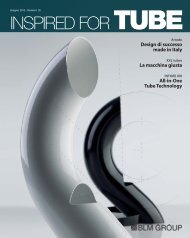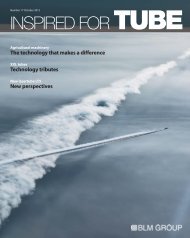Download pdf - BLM GROUP
Download pdf - BLM GROUP
Download pdf - BLM GROUP
You also want an ePaper? Increase the reach of your titles
YUMPU automatically turns print PDFs into web optimized ePapers that Google loves.
Opinion<br />
If one looks at the ranking of the top 100 American<br />
companies today, more than half did not exist<br />
twenty years ago. This simple observation says two<br />
things. Firstly, the American economy is the motor<br />
that drives the rest of the world as it is the most dynamic<br />
and has the capacity to subject itself to continual<br />
reflection and renewal. Secondly, it can be<br />
considered that, as the economy is always changing<br />
rapidly, there is also always room for companies<br />
to climb up the table. For example, in Europe, Ireland<br />
has been a catalyst for a spectacular<br />
increase in growth in recent<br />
years. When they joined the European<br />
Union, they were one of the<br />
poorest in the Community; today their<br />
output per capita is superior to that<br />
of the United Kingdom. Naturally, if<br />
one wishes to see the most astonishing<br />
growth phenomena one must<br />
look towards Asia. The largest and<br />
most populated continent in the<br />
world is also the most ancient and<br />
complex. Their people did inherit their<br />
extraordinary capacity for evolution.<br />
Consider China. Their influence on<br />
overall world trade is limited, even<br />
compared with the UK and Italy, and is relatively<br />
static. But, in dynamic terms, their contribution to<br />
the world economy between 2003 and 2006 will be<br />
equal to that of Japan. If its contribution to the growth<br />
in world imports is considered over the same period,<br />
China is superior in net growth to the United<br />
States and the Euro zone put together with a value<br />
nearly three times that of Japan; from this perspective,<br />
China is easily number one. Turning to the<br />
American ranking, it can be noted that, with all the<br />
talk of technology, the highest turnover company is<br />
a commercial company in the food industry: Wal-<br />
Mart. In the leading group, there is a small number<br />
of companies in the medium technology sectors<br />
such as petroleum and refining and the automobile<br />
industry. The market, therefore, is not overwhelmed<br />
by fashion, not even by technology; it is dominated<br />
by those companies who find the best method of<br />
satisfying their customers - the more this is true, the<br />
more stable is the company. Fashion and sophistication<br />
only prosper for a while, true growth - and<br />
dependability - is built over time. And what can<br />
we say about the supposed difficulties of these family<br />
concerns competing in developing markets<br />
Wal-Mart is owned by the Waltons. The richest man<br />
in the world, Bill Gates, maintains<br />
sole control of Microsoft; the same<br />
applies to his arch rival, Larry Ellison,<br />
the Oracle owner. In Europe, the<br />
most successful automotive group,<br />
BMW, is owned by the Quandt family,<br />
and the most famous tyre company<br />
in the world - Michelin - is also<br />
owned by a single family. In India,<br />
industrial dynasties are competitors<br />
in economic development rivalling<br />
the Chinese. It is possible to continue<br />
with these examples; there are<br />
many. What is the unique strength<br />
these family groups possess Dedication<br />
over a long time. These are<br />
words missing from a strict definition of somewhat<br />
impersonal capitalism. Economic growth creates<br />
worldwide well-being but is also creates problems.<br />
The biggest of these is the need for conservation<br />
of natural resources which should be for the benefit<br />
of all. A more correct response must be to develop<br />
technologies appropriate to each specific<br />
need. Then those highly competitive companies<br />
can unite and harness their capacity to accommodate<br />
the skills of a diverse population.<br />
Gian Maria Gros-Pietro<br />
Vice-President ADIGE SALA S.p.A.<br />
Head of Department of Economics and Business<br />
LUISS University, Rome<br />
INSPIRED FOR TUBE<br />
Gian Maria Gros-Pietro, economist, has recently been<br />
appointed Director of the Department of Economic<br />
Science and Trade of the Luiss University in Rome.<br />
He has been a Director of the Institute of Research<br />
and Development for over twenty years. The Institute<br />
is the most important centre of the National Council<br />
for Research in Economics.<br />
He has been a consultant to various Italian Government<br />
Ministries, especially in the field of industrial politics,<br />
since 1970.<br />
In 1994 he became a member of the Committee for<br />
Global Consultation and Guarantees for Privatisation.<br />
In 1997 he was nominated President of the IRI with<br />
the task of privatisation of companies and closure.<br />
In 1999 he became President of ENI to oversee transition<br />
to a free energy market within Italy.<br />
In 2002 he was nominated President of Autostrade,<br />
a completely private company, and from December<br />
2003 he was also President of Federtrasporto.<br />
He has been an economic consultant to UCIMU (The<br />
Italian Machine Tool Trade Association), since the early<br />
1980’s and has worked with the <strong>BLM</strong> <strong>GROUP</strong> for<br />
many years; he is Vice President of ADIGE SALA SpA<br />
and a Director of <strong>BLM</strong> <strong>GROUP</strong> UK Ltd.<br />
No. 2 - october 2004<br />
3
















